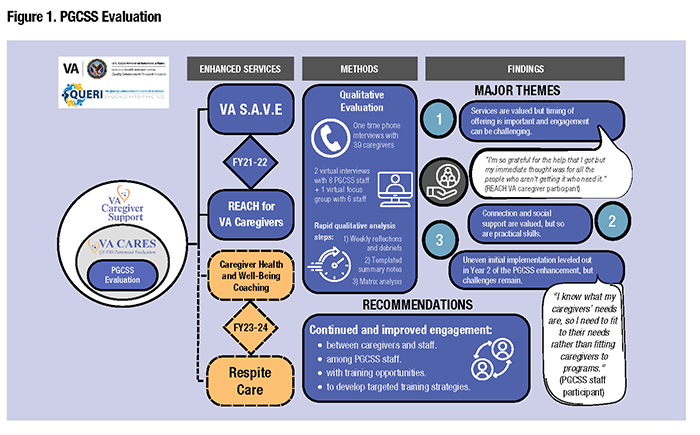
|
|
Research HighlightPartnered Evaluation of the Enhanced Program of General Caregiver Support ServicesKey Points
Over 5.5 million family caregivers provide often unpaid care to aging and disabled Veterans across the United States.1 Given increasing reliance on family caregivers to maintain the highest quality and least restrictive care for Veterans, VA is expanding services offered through the Caregiver Support Program (CSP), including its Program of General Caregiver Support Services (PGCSS). PGCSS includes peer support mentoring, skills training, coaching, telephone support, online educational programs, referrals to mental health services and other resources, and respite care for eligible caregivers. In FY21, CSP enhanced PGCSS by providing funding to support one PGCSS staff member at every VA site, setting minimum practice standards, and rapidly delivering new supports and services. Amid national expansion, rigorous evaluation of PGCSS enhancement is critical to optimize services and ensure high quality, inclusive, personalized, and holistic support for caregivers. Formative Evaluation of Enhanced PGCSS Services and SupportsAs part of an ongoing evaluation of CSP, in FY21 – FY22 the VA Quality Enhancement Research Initiative (QUERI) VA Caregiver Support Program Partnered Evaluation Center (VA CARES) evaluated the delivery and impact of two evidence-based PGCSS enhancement services.
The VA CARES research team designed a qualitative evaluation to understand caregivers’ experiences with these two services and factors that might have impacted those experiences. The design included collecting information from enrolled caregivers and PGCSS staff implementing these new services. The team engaged a total of 39 caregivers who participated in VA S.A.V.E. and/or REACH VA in a one-time, semi-structured phone interview. The team purposively sampled staff from seven sites that had high or low enrollment volume of new caregivers in early FY21, and invited them to participate in a series of two virtual interviews and a virtual focus group. Eight PGCSS staff members participated in initial semi-structured interviews, six participated in a second interview, and six participated in a single focus group. The VA CARES team analyzed the interviews using rapid qualitative methods. The team identifed three overarching themes through this analysis.
Caregivers and staff in this evaluation offered the following suggestions for improvement.
Overall, caregivers and staff offered suggestions for improving VA S.A.V.E. and REACH VA, while clearly articulating the value of those trainings for caregivers. Future DirectionsBuilding on the formative evaluation, VA CARES will conduct evaluations of two other pivotal PGCSS enhancement services: the Caregiver Health and Wellbeing Coaching Initiative (CHWC) and respite care. Built upon the VA Whole Health framework, the CHWC is a six-day training course designed to equip CSP staff with Whole Health Coaching skills, knowledge, tools, and self-care skill building techniques to better support caregivers on their caregiving journey. The CHWC will be expanded over the next two years with the goal of having at least one CHWC trained staff member at every VA facility by the end of FY23. In partnership with CSP, VA CARES will examine the effectiveness and implementation of the CHWC expansion. Guided by the Reach Effectiveness Adoption Implementation Maintenance (RE-AIM) framework and the Consolidated Framework for Implementation Research (CFIR), this evaluation will demonstrate impacts of the CHWC on caregivers and elucidate strategies to improve delivery of these services. Respite care is designed to provide caregivers a short break from caregiving responsibilities through both formal supports (e.g., paid home-based and nursing home care) and informal supports (e.g., respite goal planning, self-care resources, other members of the caregiver’s social support network). CSP is currently enhancing respite services through innovations such as site-specifc respite champions and self-guided respite planning tools for caregivers. Using mixed methods approaches, combined with rapid feedback from CSP, VA CARES will evaluate barriers to use of respite care and identify areas to optimize respite services offered through PGCSS. The formative evaluation of PGCSS expansion acts as a stepping stone to determine the reach, delivery, and quality of other expanded caregiver services. Knowledge gained from this multipronged PGCSS evaluation will be used to improve support for caregivers across VA. 
References
Disclaimer: This work was completed while Lauren Penney was employed by the South Texas Veterans Affairs Health Care System. Acknowledgements: We would like to acknowledge the Caregiver Support Program, especially lead operational partners, Dr. Colleen Richardson, Leah Christensen, and Timothy Jobin, for their leadership and effort in relation to this evaluation. |
|